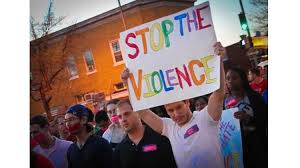- About
- Topics
- Picks
- Audio
- Story
- In-Depth
- Opinion
- News
- Donate
- Signup for our newsletterOur Editors' Best Picks.Send
Read, Debate: Engage.
| August 17, 2017 | |
|---|---|
| topic: | LGBT Rights |
| tags: | #HIV/AIDS, #LGBTQ, #National Aids and STI Control Program (NASCOP), #Penal code |
| located: | Kenya |
| by: | Cherotich Kenei |
This caused a strain in the healthcare system. But with education and improved health care provisions both preventive and diagnostic, the rate of HIV cases that stood at 10.5% witnessed in 1995 had dropped to 5.9% in 2015.
However, through government campaigns geared towards sensitizing the public about the disease have been successful in minimizing the transmission risk between sexually active partners, stigma, religion and politics still hinder the eradication efforts especially in marginalised communities such as the Lesbian, Gay, Bisexual, Transgender and the Queer (LGBTQ).
In Kenya being in the LGBTQ community is punishable under Kenya's Penal code section 162 through to 165 and carries a sentence of up to fourteen years. Therefore, being marginalized is not only an outlaw but also a dangerous affair. According to the latest HIV prevalence statistics, men who have sex with other men often abbreviated as MSM had an 18.2 per cent rate of infection in 2015, almost three times that in the general population; exacerbated by the humiliation faced by gay people in the healthcare systems.
Michael (alias), who is gay, HIV positive resident of Nairobi knows all too well the discrimination faced by the marginalised in the community. A trip to the doctors that was supposed to provide a diagnostic treatment for his anal warts turned to a mortification session by the same healthcare providers that were supposed to preserve his dignity and humanity. It was not until he found Ishtar, a gay-friendly clinic that provides care without discrimination that he resumed seeking treatment and counselling from a healthcare provider.
Ishtar clinic, the first of its kind in Kenya was established to address the needs of the MSM community. The clinic attends to at least 10 people every day and has partnered with the government’s health ministry to ensure the constant provision of technical support and delivery of condoms and lubricants, which are the most essential amongst the LGBTQ community. It does, however, have plans to expand and provide the necessary services, including the provision of ARVs.
Additionally, according to Peter Njane, the Director of Ishtar-MSM clinic, surveys carried out amongst MSMs estimated that more than 10,000 men practised same-gender sex. Furthermore, he added that since the act is seen as a vice in the eyes of the law, such relationships are kept secret and accessing accurate information about the disease and preventive care is difficult. Njane says, “you have a situation where small kids are coming here and saying they never knew that having sex with another man would put them at risk of contracting HIV. They think it is a safer way of having sex because the information out there is that HIV infection occurs between men and women”.
Moreover, accessing specialized treatment related to one's sexual orientation is even harder, leaving the marginalised without a safe place to seek the necessary medical assistance they need. "How do you, for example, tell a doctor that you have anal gonorrhea? In Kenya, we don’t talk about sex, so it is even harder to talk about sex between people of the same gender” Njane states.
Furthermore, in Kenya the distribution of information relating to HIV amongst the LGBTQ community doesn’t go without accusations of promoting homosexuality, leaving organizations to use the snowballing method to reach their targeted audience. However, to curb the transmission risk amongst gay men, the Ministry of Health has partnered with non-governmental organisations such as Ishtar to carry out mobile clinics in areas predominated by the gay men around the country. They have also trained peer educators who follow-up and ensure that patients adhere to their HIV treatment.
Though measures have been put in place to help mitigate the spread of HIV/AIDS amongst the marginalized communities more is needed from both the MSM and government parties. Mary Mugambi a program manager for key populations at National Aids and STI Control Program (NASCOP) states “The fact that you don’t come out clearly about your sexual orientation makes it difficult for you to get the right information. Unless they accept themselves and come out, they might not get the right information.” A statement that sums up the reason as to why the prevalence rate still remains so high in the LGBTQ.
On the other hand, the government needs to play a role in shielding the marginalised communities from discrimination. Discriminating the LGBTQ community only fosters an infringement on basic rights, human rights such as healthcare provision that play a crucial role in the alleviating and ending of HIV/AIDS in the country.
For now, it is vital that a permanent solution be found to avoid the marginalization of citizens by their sexual orientation if Kenya is to ever reach the zero transmission of HIV/AIDS threshold; But in a country still heavily stigmatized by the marginalised, it will take more than the commandment of love to make this a reality.
By copying the embed code below, you agree to adhere to our republishing guidelines.
